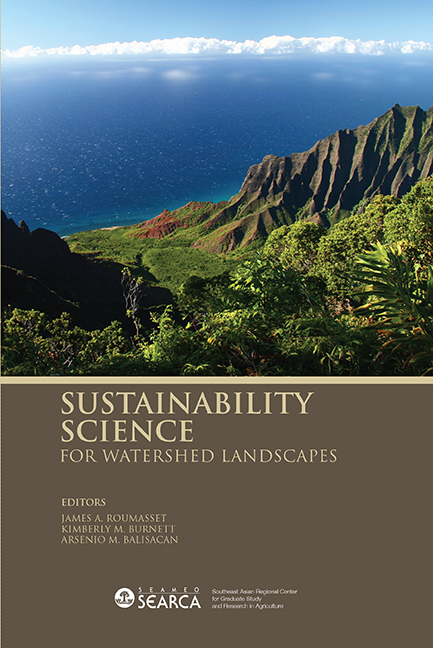Foreword
Published online by Cambridge University Press: 21 October 2015
Summary
The goal of Sustainability Science for Watershed Landscapes was to synthesise the third wave of sustainability science and make science directly relevant to specific pressing policy questions. Current efforts are grounded in almost four decades of international concern commencing with the Stockholm Conference on the Environment (1972), and including, to mention only a few of the key initiatives, the Brundtland Commission (1983-1987) and the resulting report, Our Common Future (1987) and the four year Millennium Ecosystem Assessment (2005). The Assessment addressed environmental, social sustainability, and economic sustainability to meet fundamental human needs while preserving the earth's life support systems. The challenges facing us early in the 21st century are so complex that they demand trans-disciplinary approaches, coupled models, multi-scale assessment, and the involvement of stakeholders in defining our basic questions. These challenges are heightened by a changing climate. This volume presents important case studies highlighting these approaches.
It was logical for the East-West Center (EWC) to partner with the Southeast Asian Regional Center for Graduate Study and Research in Agriculture (SEARCA) and the University of Hawaiʿi in convening the 2007 “International Conference on Sustainability Science for Watershed Landscapes” that resulted in this volume. The EWC has had a sustained partnership with SEARCA and its parent organisation, the Southeast Asia Ministers of Education Organisation (SEAMEO). Furthermore, since at least the mid-1970's the EWC has been committed to the policy aspects of equitable access to resources in the Asia Pacific region. A milestone was the creation of what was then the Resource Systems Institute (1977) under the leadership of Harrison Brown. In the same year the Environment and Policy Institute (EAPI) was established under the leadership of William Mathews to study human interaction in tropical ecosystems. Both RSI and EAPI concentrated on international comparative studies with an Asian focus and hosted many Asian visiting researchers often leading to long-term research partnerships. Although there has been institutional change, the focus on the policy aspects of equitable access to resources is continued today by the Center's Environment, Vulnerability and Governance concentration, led by Jefferson Fox, a co-organiser of the meeting and a contributor to this volume.
- Type
- Chapter
- Information
- Sustainability Science for Watershed Landscapes , pp. xiv - xvPublisher: ISEAS–Yusof Ishak InstitutePrint publication year: 2010

